A Webinar on “The Role of Teachers in the Implementation of National Education Policy” was organized by the Bhartiya Shikshan Mandal and NITI Aayog in association with Maharshi Karve Stree Shikshan Samstha on 12th May 2021. The objective of the webinar was to focus on the aptitude and skill required by the teachers in the implementation of National Education Policy at the Higher Education. The webinar also focused on challenges that teachers would face in the implementation of the National Education Policy and probable solutions to mitigate the same. The webinar was graced by Professor Dr. B. A. Chopade, Rashtriya Pramukh, Anusandhan Prakoshta, BSM and Former Vice-Chancellor, Dr. B.A.M.U., Aurangabad, Dr. Bhaskar V. Tamhankar, Willingdon College, Sangli – Principal and President, Western Maharashtra Prant Bharatiya Shikshan Mandal, Smt. Swati Bhave, Vice – Chairman, Western Maharashtra Region, Bharatiya Shikshan Mandal, Dr. Kishor Desarda, Managing Committee Member, Maharshi Karve Stree Shikshan Samstha and Dr. P. V. S. Shastry, Secreatary, Maharshi Karve Stree Shiksahn Samstha. The Directors, Principals and Heads of the higher education units under MKSSS along with their respective faculty members were the participants for the Webinar. The total strength of the participants was 234.
The webinar was segregated into three sessions as follows;
Session 1 – Inaugural Session:
The webinar commenced by paying tribute to the nation with the National Anthem and taking blessings of goddess saraswati and the foundation pillars of the Maharshi Karve Stree Shikshan Samstha – Anna and Baya Karve by reciting the aashramgeet. The webinar was formally declared open by the welcome speech of Dr. Kishor Desarda, Managing Committee Member, MKSSS. Sir also Highlighted the importance of vocational skill sets required for the teachers in the higher education, especially where inter-disciplinary education would be required. He also focused on having an effective governance with the help of a singular regulator. Smt. Swati Bhave, Vice – Chairman, Western Maharashtra Region, Bharatiya Shikshan Mandal formerly welcomed the dignitaries and the participants on behalf of the Bharatiya Shikshan Mandal and explained the need for the webinar for effective execution of the National Education Policy.
Professor Dr. B. A. Chopade, Rashtriya Pramukh, Anusandhan Prakoshta and Former Vice-Chancellor, Dr. B.A.M.U., Aurangabad delivered his speech on “National Research Foundation – Perspective, Prospects and Implementation”. The participants were fortunate to get a lot of inputs. Sir, focused on the importance of Research and Innovation and developing research aptitude in the teachers. He highlighted the fact that lack of research is the main reason for poor quality higher education in India. Sir briefed the participants about the role and importance of National Research Foundation stressing the objectives of National Research Foundation being to seed funds for research to all domains and acting as a liason between Government, Universities and Industry.
Dr. Bhaskar Tamhankar, Willingdon College, Sangli Principal and President, Western Maharashtra Prant Bharatiya Shikshan Mandal, delivered his speech on “Skill Development in Teachers”. He stressed on the need of development of skill sets in the teachers at the higher education. Sir, focused on the leadership skills, organizational skills, communication skills, problem-solving skills, decision – making skills, presentation skills, critical thinking, management skills, technical skills and development of passion of passion and creativity amongst the teachers at higher education.
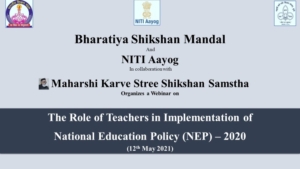 |
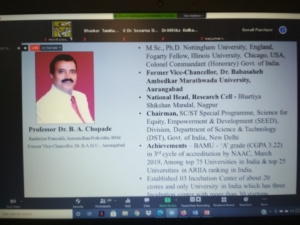 |
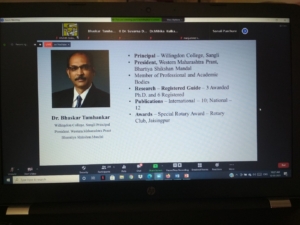 |
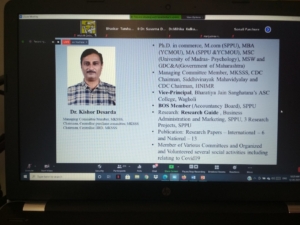 |
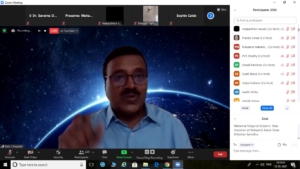 |
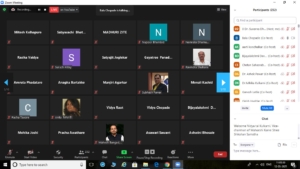 |
Session 2 – Break – Out Session:
In the Break – out session, participants were segregated into groups that were headed by a Group Leader to make deliberations on the following points;
- Catalysing quality academic research: A focal point
- Effective restructuring of the curriculum in higher education in accordance with provision of NEP
- Higher Education in Bharatiya languages for unleashing untapped potential
- Inclusive education for a harmonious society by given opportunities to SEDG
- Developing motivated and capable faculty through pre-service and mid-service training
- Quality Universities and Colleges: For Holistic and Multi-disciplinary Education
The highlights of the deliberations at the Break – out session was as follows;
| Group No. | Title | Challenges | Probable Solutions |
| G – 1 | Quality Universities and Colleges: For Holistic and Multi-disciplinary Education | Employability of students and value education programs for students | Inculcate creativity among students |
| Benchmarking / standards for education system | Teacher’s training for innovative pedagogy techniques | ||
| Multidisciplinary approach, Quality of teachers and edupreneur approach among the teachers | Continuous professional development
Field training and sabbaticals |
||
| Sustainable employment policy for the teachers by the government / regulating body, environment for quality upgradation, appraisal of teachers / feedback | |||
| Ecosystem for research and awareness about social issues | |||
| G – 2 | Catalysing quality academic research: A focal point
|
Absence of research culture from school | Inculcating research culture from school |
| Absence of reading culture
|
Organizing Faculty Development Programmes for developing the research culture and attitude | ||
| Collaborative research culture between faculty and students | Short – term research courses for students & staff | ||
| Research Activities related to multi – disciplines like Research Competition, publication of Research Journal at the Samstha level | |||
| G – 3 | Effective restructuring of the curriculum in higher education in accordance with provision of NEP
|
Need for experts in designing the curriculum with holistic approach | Thorough scrutiny of the experts involved in the designing of the curriculum |
| Lack of multi-disciplinary approach | Minimum standards to be set | ||
| Rigid system in the implementation of curriculum | Importance of forming clusters for holistic development | ||
| Collectiveness and inclusiveness to be addressed | |||
| Importance to understand the knowledge at the local level | |||
| Restructuring of research culture | |||
| G – 4 | Developing motivated and capable faculty through pre-service and mid-service training
|
Developing multidisciplinary thinking approach | Pre-service training being given at the school and secondary education level, mid – service training to be given at the higher education level |
| Use of advanced technology in class rooms | Mid – service training to be given to the teachers at the higher education in all the areas listed for the listed challenges | ||
| Mentoring and Counseling sessions | |||
| Developing students into lifelong learners | |||
| G – 5 | Inclusive education for a harmonious society by given opportunities to SEDG
|
Lack of knowledge at students as well as parent’s level | Create empathetic group to reach out to the needy students |
| Mindset of the parents | Linkages to be created between industry, higher education and school | ||
| Extensive use of provisions for the needy students | |||
| To keep continuously working on this issue | |||
| G – 6 | Higher Education in Bharatiya languages for unleashing untapped potential
|
Bilingual teachers and experts | Having equitable education |
| Availability of quality content | Improved learning, reduced cognitive load | ||
| Faculty readiness | Local – Appropriate learning ( De-colonizing the syllabus) | ||
| Availability of corpora, technical glossaries | Improving the research culture | ||
| Praman Bhasa – Common languages to be used | Creating more job opportunities |
Session 3 – Valedictory Session:
The last session at the webinar was the Valedictory session, wherein, all the group leaders were invited to present the points drawn from the deliberations. The points are listed above. The Valedictory Session was then graced by the dignitaries, Smt. Swati Bhave, Vice – Chairman, Western Maharashtra Region, Bhartiya Shikshan Mandal and Dr. P. V. S. Shastry Secreatary, Maharshi Karve Stree Shiksahn Samstha. In her speech, Smt. Swati Bhave Madam briefed the participants about the structure and working of the Bharatiya Shikshan Mandal. She also focused on the need for the teachers in the higher education to work on the execution of the National Education Policy so as to put forth the challenges faced in the execution to NITI Aayog and also recommend the probable solutions for the same.
Dr. P. V. S. Shastry, pointed out the fact of education migrate which is the outcome of the present education system in his speech. He focused on the use of student – centric and inter – disciplinary approach in the higher education for which the teachers would have to extend their bandwith of their skills. He stressed on the use of updated tools in the application of education. Sir also focused on the Research attitude amongst the teachers stating that a paradigm shift from individual research to team research was the need of the hour.
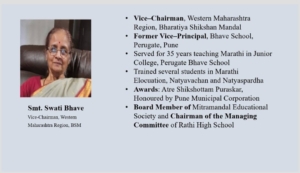 |
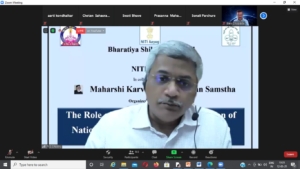 |
The entire webinar wound up by the vote of thanks, thanking the Bharatiya Shikshan Mandal, Niti Aayog and Maharshi Karve Stree Shikshan Samstha for the cooperation and support extended to organize the webinar and the recital of the Vande Mataram. The webinar was coordinated by Smt. Hiraben Nanavati Institute of Management & Research, MKSSS.

